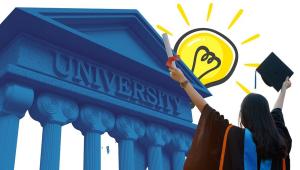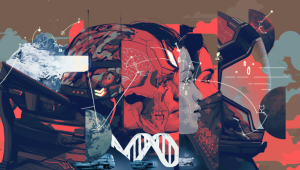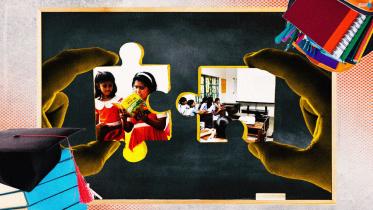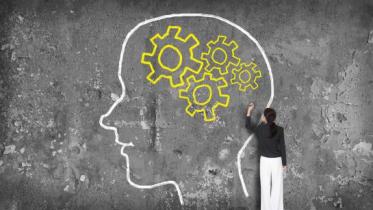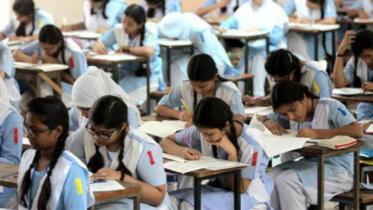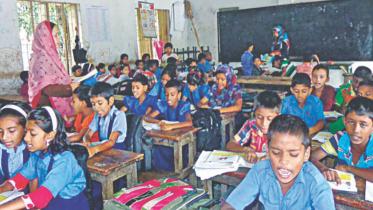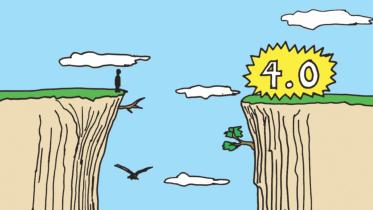Bangladesh needs life-centred education reform for students
Active learning, moral education, teamwork, and community engagement should be embedded across all subjects.
14 September 2025, 09:00 AM
Higher education commission crucial for systemic reform
It is now widely accepted that investment in human capital through education plays a crucial role in economic growth.
2 October 2024, 11:45 AM
How should our engineering education evolve?
Over the years, engineering programmes in Bangladeshi universities have stagnated, still clinging to a 20th-century structure.
12 February 2024, 04:00 AM
Our outdated, inefficient higher education institutions
The world has never witnessed such unprecedented human-to-technology interactions.
19 December 2023, 01:00 AM
The role of Bangladeshi universities in the era of AI
How many jobs will disappear in a country depends on the industry, type of work, and pace of AI development.
24 September 2023, 00:00 AM
Accreditation: A proven method to get programme recognition
At the time of Bangladesh’s liberation, there existed only six public universities, and the total number of students was around 25,000.
28 May 2023, 06:00 AM
Impact of the fourth industrial revolution on classroom education
Bangladesh cannot ignore the changes brought about by the fourth industrial revolution.
14 August 2022, 04:00 AM
Keeping up with the Fourth Industrial Revolution a crucial factor in economic growth
Over the past decade, there has been tremendous interest in understanding how technology is shaping the nature of work and education around the world.
11 December 2021, 18:00 PM
Why knowledge-based economies are richer
It is inarguable that education is important, as it opens the door to a better life for everyone.
18 November 2019, 18:00 PM
Research universities can light the way for tomorrow’s Bangladesh
Higher education is rapidly expanding in developing countries. There were only four public universities at the time of Bangladesh’s inception as a sovereign country in 1971. The country has now a total of 43 public and 103 private universities. The number of students enrolled in universities has shot up from 4,11,717 in 2008 to10,28,314 in 2018 (BANBEIS). But what does it mean for economic development?
2 July 2019, 18:00 PM
How universities can improve student satisfaction and quality of learning
Societies in both developed and developing countries are increasingly aware of the vital role that university graduates can play to advance their economies. Many examples can be cited where graduates helped to pull their countries out of recession (David Willetts 2017).
10 June 2019, 18:00 PM
Creating a generation of learners and innovators
The curriculum for any undergraduate programme is highly influenced by the social, physical, economic and cultural environment. Consequently, with the change of any such setting(s), its development process will also change. The great economist and Nobel Laureate, Wassily Leontief, wrote in 1953 that “labour will become less and less important… More and more workers will be replaced by machines.”
28 February 2019, 18:00 PM
Rethinking engineering education in Bangladesh
During the twentieth century, engineering education in the developed countries underwent a remarkable transformation.
10 February 2019, 18:00 PM
A new learning paradigm
In the beginning of the twentieth century, a growing number of educators, professionals and representatives of the business community in western countries began to realise the shortcomings of the traditional education (TE) system.
16 January 2019, 18:00 PM
Thinking School: A catalyst for transformational change in education
It's a common scene to see children in our streets in the early morning going to school, carrying heavy bags full of books on their shoulders.
6 November 2018, 18:00 PM
Some thoughts on university grading systems
Grading is an integral part of a student's life. Grades or marks are the primary means of evaluating a student's academic performance.
13 February 2018, 18:00 PM
What's in an academic calendar?
Bangladesh started with only four public universities and now has a total of 38 public universities and 92 private universities.
5 February 2018, 18:00 PM






